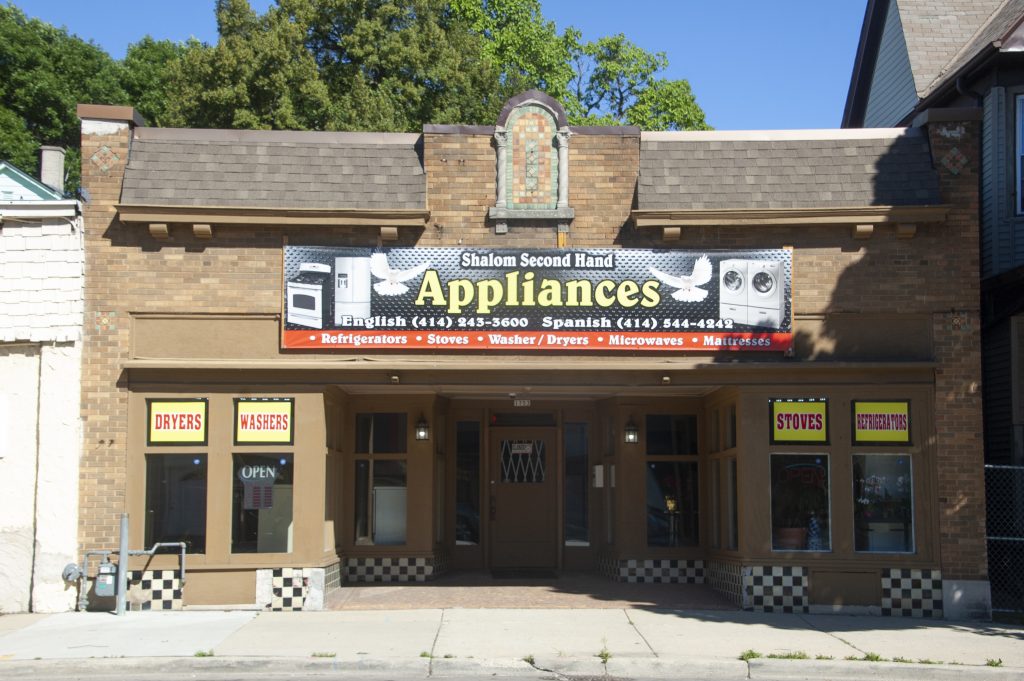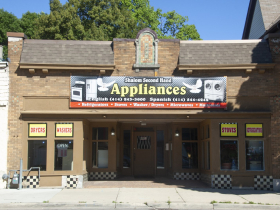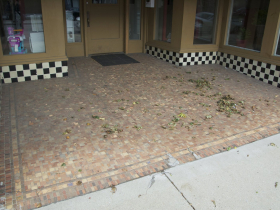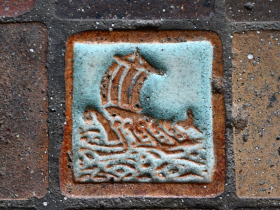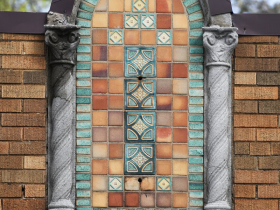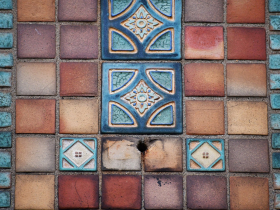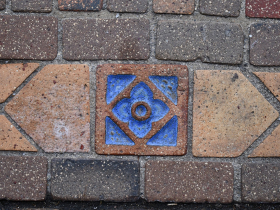A Historic Gem at 17th and Muskego
Retail shop boasts tile decorations from the 1920s with handmade tiles from the Continental Faience & Tile Co.
Nowadays, when a retail business puts up a brick-and-mortar building, they are largely all the same, often concrete warehouses. The oversized logo above the entrance is what captures buyer’s attention, not the architecture. A hundred years ago was a totally different story.
A tiny retail building on South Muskego Avenue shows this contrast well.
It was a turn-key property built by the Starszak Realty Company in spring 1929. Actually, it was an alteration to an already-existing building from 1909 for the G. H. and S. W. Gottschalk real estate firm, designed by Leiser & Holst. Starszak hired contractor H. Gersonde to complete the work, which featured a single-story brick façade with a mansard roof and tile decorations.
The tile decorations included several panels featuring handmade tiles from the Continental Faience & Tile Co., of South Milwaukee. These included square insets embellished with decorative tiles and a large centerpiece on the parapet. The design has geometric and floral motifs enhanced by unglazed, warm-colored tiles that contrast with turquoise glazed tiles.
There are Continental tiles on the floor as well, outside where you walk up to the front door. The tiles are meant to appear like a giant rug. In the middle is a collection of 1 and 2-inch unglazed tiles called Valencia Mosaic with a color scheme called Sunset Flash. Bordering these are 2-inch decorative inserts with floral motifs, volutes and a sailing ship.
There are also a couple tiles not by Continental, but products of the Flint Faience Tile Company from Flint, Michigan, on the parapet. It’s design number 1156, from Flint, of radiating fleur-de-lis.
Many properties built in the late 1800s were altered in the 1920s with brick and tile façades for a number of reasons: the updates were modernized with fireproof materials, they followed contemporary design trends, and their colorful tiles added an attractive feature to draw customers into their businesses.
This property at 1753 S. Muskego Ave. was an example of this, and the first occupant to test out the benefits of this design was William R. Bluemel, who took ownership of the building shortly after the alteration was completed in September, 1929.
In the late 1920s, Bluemel was the president of the Muskego Avenue Advancement Association and ran a clothier business on the corner of Mitchell Street and Muskego Avenue with his partner, William Jandt. Their business, Jandt & Bluemel, began selling high-grade clothing and furnishings in the late 1890s. Although his partner died in September, 1924, Bluemel kept the business name as Jandt & Bluemel.
This storefront is one of the fanciest façades on Muskego Avenue, which is saying a lot since there were plenty of turrets, pediments, cornices, and other decorative trimmings on Muskego. The tiles and their colorful motifs certainly added to the prestige of the Bluemel establishment.
However, the store’s opening was unfortunate as it came months before the stock market crash of 1929 that led to the Great Depression, and Bluemel’s business must have suffered. He continued business at 1753 until at least 1932, possibly longer, but in 1935 there was a newspaper advertisement for an entire stock sale at reduced price at 744 North Third Street. After 38 years of business, this was possibly the end for Jandt & Bluemel.
In 1935, a new owner arrived, a dealership for the Milwaukee Harley-Davidson. A poster inside the building today tells us it was run by Bill Knuth and his brother Carl. Bill Knuth was a close friend of William Harley, and they apparently sat at the kitchen table together working on new motorcycle designs. The Knuth dealership was known as the “secret R&D” department for Harley-Davidson, and they sponsored racers as an unofficial adjunct to the factory race team. The Knuths also had their own race team, the Knuth Klimbers, during the 1920s and 30s.
The Knuths founded their first dealership in 1925 at 2491 North Fond Du Lac Avenue. They opened a second location on the South Side at 1415 W. Mitchell Street in 1932, and moved to 2629 W. National Avenue in 1934. Then, by the end of 1935, they moved their southside location again to Muskego Avenue. Perhaps the handsome design of the brick and tiles on the storefront enticed the move. Knuth’s motorcycle shop continued to operate in this space until 1970.
Since 2017, this colorful shop on Muskego Avenue has been the home of Shalom Second Hand Appliances, run by couple Juan Sánchez Reyes and Teresa Perezofa. Their business originally started on Mitchell Street in 2013, where they sold all kinds of second-hand items. When they moved to 1753, they transitioned to specializing in appliances with Juan primarily fixing and servicing the machines and Teresa handling sales.
Property owners José Luis Sánchez and Karla Quintanilla bought the building about 15 years ago. Their original idea was to have the space be the home for their embroidery business. They began creating embroidery for custom-designs in 2004 on 16th and Walker Street, then in 2006 moved to their current location on the corner of 26th and Greenfield Street. Over the years, they’ve created embroidered patches for many local Milwaukee businesses, including El Rey, La Casa del Alberto, Oakland Gyros, Just Pro Garage Doors, O Yeah Chicken and More, among many others.
José’s and Karla’s embroidery work keeps them busy, creating approximately 200 designs a year, and they have recently expanded into the building next door. Meanwhile, they have continued to maintain 1753 S. Muskego Ave. as original as possible. They protected the façade with parapet coping and replaced the crumbling tiles on the bulkhead. It’s certainly a project taking care of an aging property from 1929.
Fortunately, the hand-made Continental tiles have been preserved. This is important because this storefront has one of the most elegant examples of Continental tiles for a retail business. The entrance has a few cracks in the floor, which have been filled in with mortar. Certainly, a far better result than the expensive process of completely replacing the floor with concrete. Storefronts from the late 1920s still have entrances with Continental tiles like this, but very few have decorative inserts like 1753.
When talking with José, he expressed delight to learn that a property he owns has so much historical value with its locally made faience tiles.
His building is also documented in my latest book, Carl Bergmans and the Continental Faience & Tile Co., co-authored with Kelly Dudley and Kathy Roberts. The storefront is one of many tile installations featured in the book, and includes the history of the company and its factory, its tile products and techniques, and much more! It’s available for $60.00 plus tax and can be purchased at the Urban Milwaukee: The Store at 755 N. Milwaukee St.
These tiles have witnessed many businesses come and go, and hopefully they can be preserved for years to come, so that future businesses can have these vintage decorations to help attract customers to their store.
Photos
This is the six in a series of stories on tile artworks in Milwaukee by writer Ben Tyjeski, an art teacher who was named a 2023 Mildred L. Harpole Artist of the Year by the Milwaukee Arts Board.
If you think stories like this are important, become a member of Urban Milwaukee and help support real, independent journalism. Plus you get some cool added benefits.


